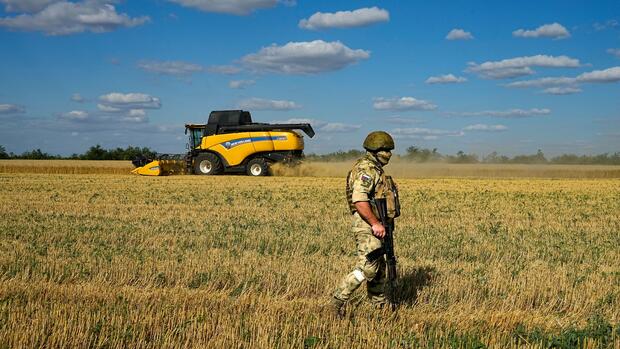The expiry of the agreement is also bad news for Ukrainian farmers.
(Photo: AP)
Riga, Geneva The grain deal was extended several times so that Ukraine could export agricultural goods by ship, at least to a limited extent, despite the war. But now the agreement will probably finally expire on Tuesday night.
Kremlin spokesman Dmitry Peskov said Monday Moscow would not return to fulfilling the agreement until all of Russia’s demands for exports of Russian grain were met. However, there is little hope that an agreement will be reached at the last minute.
The agreement, almost a year old, enabled the safe shipment of grain from Ukraine across the Black Sea. In return, Moscow had recently called for significant easing of the sanctions for its fertilizer and food exports, including insurance, freight and financing.
The Kremlin also called for the State Agricultural Bank to be freed from Western sanctions and reconnected to the Swift payments system to conduct business.
“It is bad news that Putin does not want to extend the grain agreement,” Chancellor Olaf Scholz wrote on Twitter on Monday. Russia does not feel responsible for good coexistence and threatens the whole world with its attack on Ukraine.
The agreement had guaranteed the transport of Russian grain across the Bosphorus.
(Photo: dpa)
Experts expect that the end of the agreement will have a noticeable impact on the global food supply – and on Ukraine itself. The country is of great importance for the world food supply. In 2021, about 10 percent of global wheat exports and 13 percent of corn exports came from Ukraine. According to the Hellenic Shipping News website, Ukraine’s total grain exports had reached around 48 million tons in the July 2021-June 2022 season.
>> Read here: Europe’s breadbasket under threat: “Many farmers are struggling to survive”
According to Heinz Strubenhoff, who advises the European Commission and the German government on agricultural issues relating to Ukraine, the importing countries in particular are expected to have a major impact. At the same time, the reports that the initiative is likely to come to an end for the time being are “also bad news for the Ukrainian farmers” themselves.
“Global prices will first rise because all developments relating to the grain deal have a strong signal effect,” says Strubenhoff. For the farmers in the country, however, “the prices will first drop”, according to the expert, “because of the high risks and the transport costs that the traders will then have to bear as well”. Many farmers are already struggling with a massive lack of liquidity.
“Severe setback” for global food security
According to Strubenhoff, Ukraine “already has a plan B”. One way to partially maintain exports could be to require international escorts for the ships. Diplomatically, Kiev is pulling out “all the stops,” says the expert, who is currently working in the Ukrainian capital. Grain could also be brought across the Danube by barge to the Romanian Black Sea port of Constanta.
Russia does not continue to extend the agreement on exports of Ukrainian grain.
(Photo: dpa)
The third way, EU-supported overland transport by truck and rail (the so-called “Solidarity Lanes”) is possible, but “very expensive”. In addition, there are long waiting times for trucks at the borders. In his estimation, however, the Ukrainian side is not completely surprised by the situation.
Martin Rentsch from the World Food Program calls the end of the grain agreement a “serious setback” for global food security. “The agreement helped bring prices down again after the start of the war against Ukraine,” says Rentsch. According to Rentsch, this stabilizing effect would be lost without the agreement. Those countries that are particularly dependent on grain from Ukraine and in which people spend a particularly high proportion of their income on food are particularly affected.
Rentsch does not believe that alternative transport routes can fill the gaps. “A ship can transport 30,000 tons of grain, a large freight train maybe 2,000 tons, a truck just 40 tons.” Ukraine urgently needs the sea route.
More than 1000 ships were underway as part of the initiative
So far, almost 33 million tons of agricultural goods have been exported from the Eastern European country as part of the initiative, as determined by the UN. More than 1,000 ships left Ukrainian ports and sailed to and from the Mediterranean via safe humanitarian corridors.
In recent months, however, the amount of agricultural goods exported from Ukraine has declined. Ukraine accused Russia of delaying the agreed inspections. No ship has been approved for the initiative since June 27.
>> Read here: Traffic jam at Polish-Ukrainian border crossing due to peasant protests
In addition, the initiative also had a political dimension, it was considered the only long-term agreement between the warring parties Russia and Ukraine.
After the start of its war of aggression against Ukraine in February 2022, Russia blocked the neighboring country’s sea exports. On July 22, 2022, Ukraine, Russia and Turkey agreed on the initiative in Istanbul. The UN acted as mediator. The agreement has been extended several times.
A second agreement was reached in Istanbul between the United Nations and Russia. In a “Memorandum of Understanding”, the UN agreed to support the unimpeded export of Russian food and fertilizers to world markets.
Russia repeatedly complained about the lack of implementation of the memorandum. Kremlin chief Vladimir Putin has demanded that Russia’s agricultural bank be reconnected to the Swift international payment system.
More: What the Ukraine war means for the climate – researchers calculate the footprint
